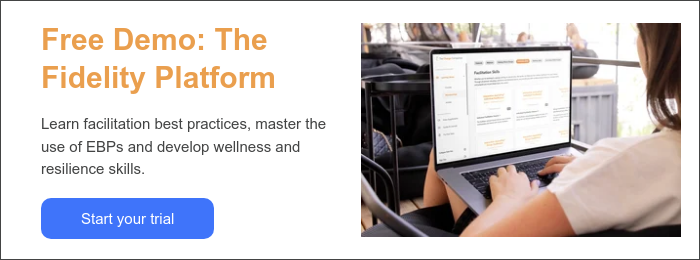Addressing Literacy Concerns

More than 43 million Americans have low literacy skills. That means roughly 1 in 5 U.S. adults have difficulty understanding simple written sentences in English.¹ Only 12% have the health literacy skills needed to navigate the American healthcare system.²
It’s a good idea for facilitators to assume everyone has some difficulties with health literacy. Learning disorders can contribute to low literacy skills, but there are many other factors that affect reading skills. All individuals can benefit from simple and consistent materials and facilitation.
Interactive Journals from The Change Companies are designed to be widely accessible and meet the needs of as many participants as possible. Journals include bite-sized copy, simple language and illustrations designed to reinforce concepts and aid comprehension.
Literacy concerns also can be addressed through effective facilitation strategies. A participant’s reluctance to complete or share assignments is one clue of a potential difficulty with reading or writing. If possible, it can be helpful to assess reading ability in advance of group sessions to avoid embarrassing participants in front of others.
When literacy is an issue, consider these options:
-
Slowly read the page content aloud as a participant follows along. In an individual or group session, discuss their understanding of the content and their responses to the questions. Facilitators can also encourage participants to “teach back” what they’ve learned by explaining the concepts in their own words.
-
Use a buddy system. Pair the participant with a peer who understands the content. Don’t pair the participant with the brightest individual in the group but with someone slightly more proficient. Have them work as a team in reading and talking about the content. Participants can then summarize their work, write down keywords or draw their responses.
-
Offer alternatives to written responses:
-
Participants can use a phone or simple digital recorder to speak out loud and record their responses to the content. Facilitators can also record content and questions for participants to use outside of session.
-
Drawing activities are another helpful response technique for those with limited reading skills.
-
The Change Companies also offers digital Interactive Journals, which include the built-in option to have text read aloud and provide the same evidence-based, interactive content as printed Journals.
Adjusting facilitation strategies to match the literacy needs of each participant can improve participant satisfaction and relieve facilitator strain. Each participant can benefit from engaging with materials in the ways that work best for them.
References:
https://www.ahrq.gov/health-literacy/improve/precautions/index.html
https://nces.ed.gov/pubs2019/2019179/index.asp



